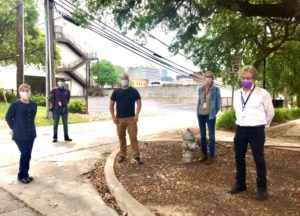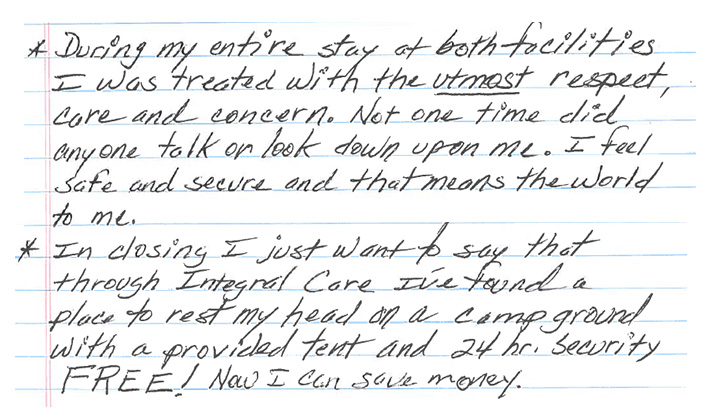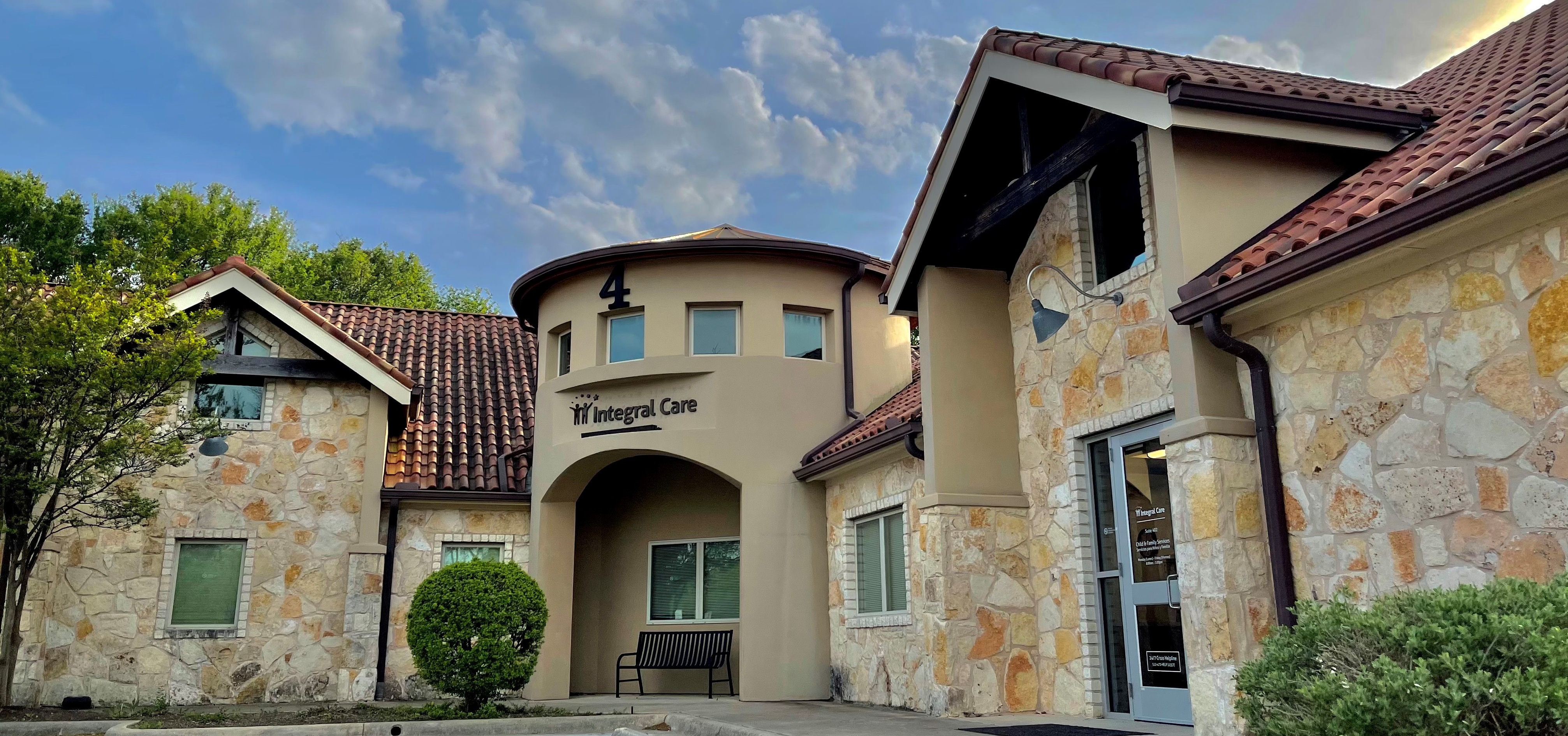TRANSPARENCIES
a monthly newsletter from Integral Care
a monthly newsletter from Integral Care

 A safe, affordable home is the foundation we all need to maintain our health, reach our full potential and contribute to our community. The pandemic has shown us how a life storm like this can exacerbate a humanitarian crisis such as homelessness and even cause it to grow. Like other major cities across the country, organizations are working together across the community to solve this problem. Integral Care staff know from experience that housing with supports creates the foundation a person needs to recover from homelessness, mental illness and other health challenges. And it saves our community precious limited resources. We have the client success stories to prove it.
A safe, affordable home is the foundation we all need to maintain our health, reach our full potential and contribute to our community. The pandemic has shown us how a life storm like this can exacerbate a humanitarian crisis such as homelessness and even cause it to grow. Like other major cities across the country, organizations are working together across the community to solve this problem. Integral Care staff know from experience that housing with supports creates the foundation a person needs to recover from homelessness, mental illness and other health challenges. And it saves our community precious limited resources. We have the client success stories to prove it.
This excerpt from a recent thank you letter from a crisis respite client demonstrates our impact.

The client is now living safely at Esperanza Community, run by The Other Ones Foundation.
When Austinites have tools like a home to regain health and stability, physical and mental health care, and job opportunities to reach their full potential, our city is stronger and everyone thrives. If you would like to support your neighbors experiencing homelessness, please consider donating basic needs items. Learn more here or visit our Amazon Charity List.

David Evans
Chief Executive Officer
 Integral Care is deeply saddened by the senseless deaths of 6 women of Asian descent in Georgia. While the roots of this crime are still being investigated, it is widely reported that hate based acts of violence against members of Asian American Pacific Islander (AAPI) communities are on the rise across the United States. The group Stop AAPI Hate tracked nearly 3,800 incidents of hate, discrimination or attacks on Asian Americans from March 2020 through February 2021.
Integral Care is deeply saddened by the senseless deaths of 6 women of Asian descent in Georgia. While the roots of this crime are still being investigated, it is widely reported that hate based acts of violence against members of Asian American Pacific Islander (AAPI) communities are on the rise across the United States. The group Stop AAPI Hate tracked nearly 3,800 incidents of hate, discrimination or attacks on Asian Americans from March 2020 through February 2021.
Integral Care is committed to ending racism. We stand with the AAPI communities now and in the future to support their health and well-being. To achieve our vision of Healthy Living for Everyone, all people must be able to live with dignity and without fear. Our community is stronger when we all thrive.
These events weigh heavily on our mental health. Please reach out for help if you need some extra support right now. Our Helpline is available 24/7 at 512-472-4357. We help people who speak languages other than English by connecting to an interpreter.
If you are interested in building your awareness of issues impacting AAPI communities, check out the extensive list below. Local organizations that serve these communities as well as Austin AAPI demographic data and history are included.
Recent Articles & Websites:
Books & Documentaries
Local Community Resources
Austin Data & Information
 As Travis County continues to grow rapidly, the need for accessible, community-based health services is more important than ever. On March 8th, our new Stonegate Clinic opened at 2501 W. William Cannon Drive. Our Adult Behavioral Integrated Health Clinic, Child & Family Integrated Health Clinic, and Medication Assisted Treatment (MAT) relocated from Dove Springs. The Pharmacy will remain at Dove Springs for the time being. Moving from a rented location to one owned by Integral Care saves limited resources and creates a more sustainable future for our services. The relocation will improve access to quality healthcare services in a more convenient South Austin location designed for our services.
As Travis County continues to grow rapidly, the need for accessible, community-based health services is more important than ever. On March 8th, our new Stonegate Clinic opened at 2501 W. William Cannon Drive. Our Adult Behavioral Integrated Health Clinic, Child & Family Integrated Health Clinic, and Medication Assisted Treatment (MAT) relocated from Dove Springs. The Pharmacy will remain at Dove Springs for the time being. Moving from a rented location to one owned by Integral Care saves limited resources and creates a more sustainable future for our services. The relocation will improve access to quality healthcare services in a more convenient South Austin location designed for our services.

The Hub Learning Community, a transition support team at Integral Care, is hosting a speaker series on issues related to intellectual and developmental disabilities. The 90-minute webinars began last month and there are 2 remaining in the month of April. CEUs are available for LPC, LMFT, SWS, and LCDC who work with the IDD community.
April 12th, 2:00-3:30pm – Adherence to Treatment: What to Do When Clients Don’t Engage
Presenter Dr. Robert Feinstein is Professor of Psychiatry at Dell Medical School, Associate Chair of Education and is the Medical Director of Special Projects for Integral Care. He is a psychiatric consultant, expert teacher, supervisor, mentor, and researcher with more than 30 years of experience in community care and higher education. Register here.
April 26th, 2:00-3:30pm – Behavior Therapy, Trauma, and Pathways to Healing
Presenter Chad Burns holds a Bachelor of Arts in Psychology from Austin College and a Master of Education in Special Education: Autism/Applied Behavior Analysis Concentration from Texas State University. He is a Board-Certified Behavior Analyst and a Licensed Behavior Analyst with the state of Texas. Register here.
March 2021: Growth and Positive Change
February 2021: How Do We Create a Better Future?
January 2021: Looking Ahead to the Legislative Session
December 2020: Supporting Your Mental Health This Winter
November 2020: How do we rebuild health and well-being during a pandemic?
October 2020: With Collaboration Comes Innovation
September 2020: Success Stories of Recovery and Suicide Prevention
August 2020: A Back to School Season Like Never Before
July 2020: Minority Health Disparities & COVID-19
June 2020: Stronger Together
May 2020: Surviving and Thriving During Uncertain Times
April 2020: Persevering During COVID-19
March 2020: Collaborations and Initiatives to Improve Health for the IDD Population
February 2020:Solutions to Health and Health Care Disparities
January 2020: Sucicide Prevention a Local Effort
December 2019: A Year of Thriving Care & Collaboration
November 2019: Teamwork and Collaboration Impact Homelessness in Travis County
October 2019:Making Strides for World Mental Health
September 2019: Taking Steps to Recovery Support
August 2019: Working Together for Child & Youth Mental Health
July 2019: Legislative Wrap-Up – Some Bipartisan Wins for Healthcare
June 2019: Strengthening Access for Veterans and the Entire Military Family
May 2019: Women and Mental Health
April 2019: Legislative Session Status Report
March 2019: Making Opportunities for Recovery More Accessible
February 2019: Recovery is Possible
January 2019: Stronger Outcomes Through Collaboration
December 2018: Looking ahead to the 86th Texas Legislature
November 2018: How Tech is Changing the Face of Mental Health
October 2018: A Few Questions Could Help Save a Life
September 2018: Anyone Can Save a Life
August 2018: A Milestone Moment
July 2018: Equity in Mental Health Care for All
June 2018: Expanding Services for Veterans
May 2018: Your Mental Health Toolkit
April 2018: Time of Terror Calls for Increased Emotional Support
March 2018: Stopping the cycle of incarceration for individuals with mental illness
February 2018: Equity in mental healthcare for everyone
January 2018 : Improving Mental Health Through Partnership & Collaboration
December 2017: Strength Through Community
November 2017 : Healthy Lifestyles Improve Well-Being
October 2017 : National Child Health Day
September 2017 : Strengthening Families and Communities